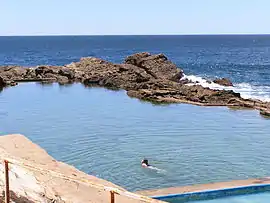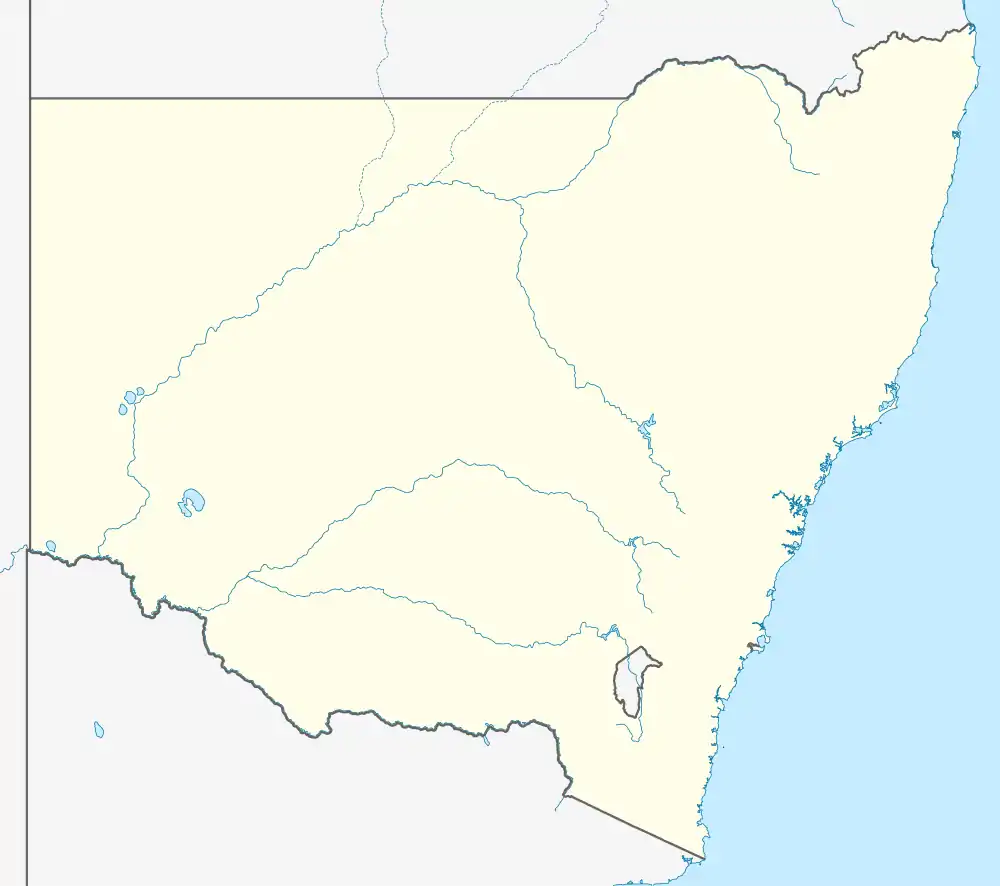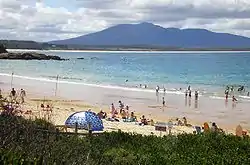Bermagui, New South Wales
Bermagui is a town on the south coast of New South Wales, Australia in the Bega Valley Shire. The name is derived from the Dyirringanj word, permageua,[3] possibly meaning 'canoe with paddles'.[4]
| Bermagui New South Wales | |
|---|---|
 The Blue Pool at Bermagui | |
 Bermagui | |
| Coordinates | 36°25′S 150°04′E |
| Population | 1,536 (2016 census)[1] |
| Postcode(s) | 2546 |
| Location | 34 km (21 mi) from Narooma[2] |
| LGA(s) | Bega Valley Shire |
| County | Dampier |
| State electorate(s) | Bega |
| Federal Division(s) | Eden-Monaro |
Geography
It is said that 12 miles offshore from Bermagui the edge of the continental shelf is at its closest point to the mainland and hence there is good fishing.[5] Anglers may catch, or tag and release; (NSW DPI Game Fish Tagging programme. 2013), Marlin, and Tuna such as Yellowfin, Bluefin, and Albacore, which are sought after "game fish."
History
A wharf was built in Horseshoe Bay in 1888 for the coastal trade. The port was serviced by the Illawarra and South Coast Steam Navigation Company.[6]
A 1910 article, 'Bermagui – In a Strange Sunset', published by Henry Lawson in The Bulletin describes a steamer journey from Bermagui to Sydney. Lawson was probably travelling with the Illawarra Steam Navigation Company.
In 1880, the Government geologist, Lamont Young, and four others disappeared while on a boat trip from Bermagui. Their boat was found near Mystery Bay, which is about 15 kilometres north of Bermagui, midway between Bermagui and Narooma, near Tilba. The bay received its name because of the disappearance.
Zane Grey, the well-known big-game fisherman of the 1930s and author of Westerns, wrote of his experiences there. He was patron of the Bermagui Sport Fishing Association for 1936/37 and anchored his yacht, the "Avalon" in Horseshoe Bay. He returned briefly for a visit in 1939.

In 1943, the Japanese submarine I-21 sank the iron ore carrier SS Iron Knight off the coast of Bermagui. Local fisherman had tangled their nets on the wreck deep below the surface in 125 metres of water, but did not know the ship lay there until a team of divers confirmed its existence on 4 June 2006. On 29 July 2006 relatives and descendants of the ship's crew came to Bermagui for a memorial and commemorative service.[7]
Population
In 2016, there were 1,536 people in Bermagui. 77.9% of people were born in Australia and 89.0% of people only spoke English at home. The most common responses for religion were No Religion 35.2%, Anglican 22.5% and Catholic 15.5%.[1]
Literature and movies
Zane Grey filmed part of his shark film White Death (1936) and wrote the storyline for Rangler River (1936) while camped at Bermagui. His book of his game fishing adventures here An American Angler in Australia was published in 1937. He also worked on his epic Australian Western novel Wildness Trek while in Bermagui, which was not published until after his death in 1944.
During the 1940s and 1950s, detective writer Arthur Upfield lived in the town and made it the setting for one of his novels, The Mystery of Swordfish Reef, published in 1943.
Dorothy Hewett (author and well known feminist and communist) wrote her gothic love story Neap Tide (Penguin, 1999) set in the fictional town of "Zane" while camped at Umbi Gumbi, Cuttagee to the south of Bermagui.
Outdoor scenes from the film The Man Who Sued God (2001) starring Billy Connolly were shot in Bermagui. There are scenes of the Bermagui Boat Harbour, the main street, and surrounding beaches. Many locals are in the movie, and the classic boat is a local charter fishing boat. Bermagui locals thoroughly enjoyed Billy Connolly's visit .[8]
In January 2005, the Leader of the Opposition, Mark Latham, and his family retreated here from the media, before his decision to resign as ALP leader and from Parliament, writing in The Latham Diaries that "God has given us Bermagui, let's enjoy it".
The historic wooden Wallaga Lake Bridge north of Bermagui was the setting for a scene in the 2014 film Unbroken.
Transport
A fishing harbour was built at Bermagui in 1959, the first in a new series by the Public Works Department.[6]
Bermagui is served by sealed road connections to Tathra (44 km south), Cobargo (20 km west) and the Princes Highway (15 km to the north) near Tilba.
See also
References
- Australian Bureau of Statistics (27 June 2017). "Bermagui (state suburb)". 2016 Census QuickStats. Retrieved 9 July 2017.

- http://www.lovenarooma.com Archived 18 May 2015 at the Wayback Machine
- "Bermagui". SMH. 8 February 2004. Archived from the original on 27 April 2006. Retrieved 19 January 2007.
- "Bermagui". Geographical Names Register (GNR) of NSW. Geographical Names Board of New South Wales. Retrieved 13 June 2009.

- "Bermagui". Sapphirecoast.info. 2005. Archived from the original on 25 March 2007. Retrieved 19 January 2007.
- "Bermagui". Maritime Heritage Online. NSW Department of Planning – Heritage Office. Archived from the original on 21 August 2006. Retrieved 18 December 2006.
- Yourguide, Narooma site, news article from Wednesday 9 August 2006. Archived 19 August 2006 at the Wayback Machine
- Filming Locations for The Man Who Sued God Archived 26 April 2012 at the Wayback Machine, IMDb. Retrieved W13 January 2006.
External links
| Wikimedia Commons has media related to Bermagui, New South Wales. |
| Wikisource has original text related to this article: |
- Information about Bermagui
- Sapphire Coast tourism site article on Bermagui
- Morningside's TravelSouth visitors guide article on Bermagui
- Bermagui – Visit NSW
- Grey, Zane (1937). An American Angler in Australia. The Derrydale Press (Now part of the Rowman & Littlefield Group). ISBN 978-1-56416-204-5.